With the County’s economy on life support, are the right demographics being targeted with resources? Prioritizing those who are “further from privilege.” A single mother’s story. If Ozias says so, it must be true. One week in, Habitat for Humanity stumbles in its commitment to transparency.
This may come as a shock, but over 80% of Clallam County is white.
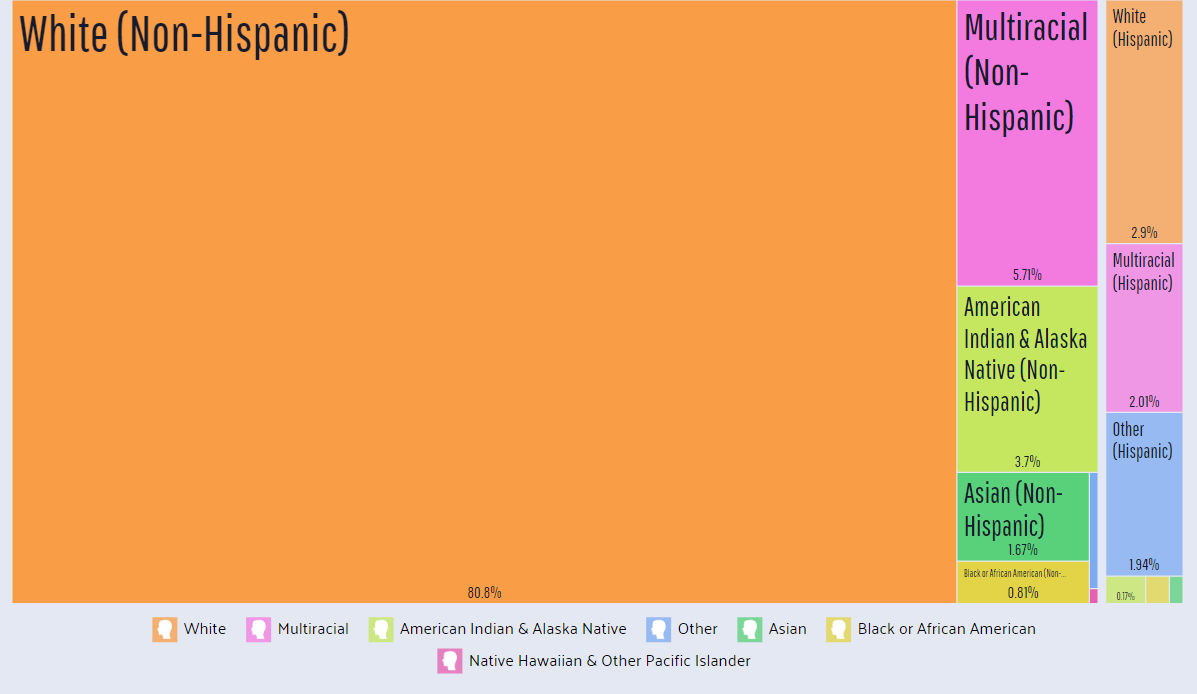
And white combined with white non-Hispanic males make up 42.2% (6,465) of Clallam County residents living below the poverty line.
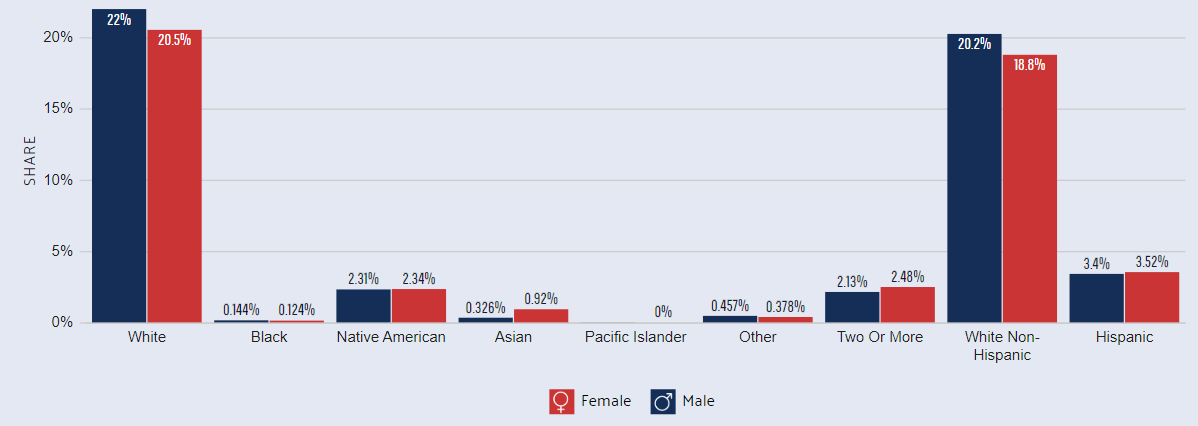
So, if you were walking in downtown Port Angeles searching for a coffee shop and saw one with a sign that said “Women-owned & gay-friendly. This inclusive establishment is free of racial and systemic oppression and injustice,” would you pause and wonder if you were welcome there?
A straight white male might.
The Center for Inclusive Entrepreneurship (CIE), located in Port Angeles, serves Jefferson and Clallam Counties. Its mission is to serve our economically depressed region by helping “people with limited resources in marginalized rural communities start a business, earn a living, build generational wealth, and lead the development of rural places where everyone and everything can thrive forever.”
CIE does this by using its values. Their website says:
We value justice, inclusiveness, diversity, equity and resilience. Everyone should be able to explore the possibility of business ownership, regardless of their circumstances. Diversity makes communities more resilient.
We value the wisdom of the individuals we serve. We honor the story of each person we serve by taking time to understand their unique gifts, aspirations, and challenges - through their voice and their eyes. We practice curiosity, mindfulness, deep listening, and optimism.
We value human empowerment. We work to create spaces where all people can discover and harness their power and agency to live lives and build communities on their own terms – free of racial and systemic oppression and injustice.
At the end of September last year, CIE had served 103 clients.
During those nine months, CIE created 39 jobs.
Nineteen new businesses were created during that time.
The Center for Inclusive Entrepreneurship seems to have excluded a group from its data. Unless the missing group is hidden in the disabled, veteran, rural, underserved, or LMI (low-to-moderate income) categories, the CIE has not been measuring its reach to straight white males.
Target rich environment
Entrepreneurship and the creation of small businesses play a vital role in rural economies and CIE provides a valuable resource by offering classes and teaching skills related to starting a business.
The “Client Stories” featured by CIE in Clallam County are disproportionate to the demographics living in poverty. The stories are focused predominantly on the business successes of women, tribal members, and LGBTQ+ entrepreneurs. However, one story from 2020 features a Sequim man starting a window cleaning and yard service business to provide for his family.
With white males being the biggest Clallam County demographic living in poverty, CIE’s data should be teeming with them. Is the CIE truly inclusive of all those who are trying to “start a business, earn a living, build generational wealth, and lead the development of rural places where everyone and everything can thrive forever?”
“Further from privilege”
CIE Program Director Rick Dickinson outlined 2024 achievements during a joint meeting with the County and Port of Port Angeles Commissioners in October last year.
“We have a very strong relationship with the Lower Elwha [Tribe]. In particular with their tribal vocational rehabilitation program,” explained Dickinson. “When they need one of their clients who is interested in self-employment, [and] when they need a business plan, [and when] they need to go after some funding, they come to us, work with us, and we’ve been able to help them do a number of business plans, and a number of clients get funding and start businesses.”
Dickinson also recounted a 2024 outreach event. “We did an initial training program out in Neah Bay, and we had one person show up; sometimes that’s how it works,” he explained.
“We’re working with a couple other Makah tribal citizens off reservation, on a couple different businesses. So, beginning to build relationships and build trust in that community and, as you know, it takes time, and patience, and consistency to build that trust in those communities,” explained Dickinson.
“We are also wanting to reach out to the Quileute Tribe,” said Dickinson who had also been working with the Forks Committee for Human Rights and attended the Dia de Culturas in Forks, where the CIE circulated a survey about self-employment needs and interests.
Dickinson had attended a Port Angeles job fair after the McKinley Paper Mill had closed. “I was able to have a couple minutes at the event at Vern Burton [event center] and spoke briefly and just talked about what we do and if there’s anybody interested in self-employment to reach out to us and, definitely had a few people at the event who reached out,” Dickinson recalled.
More than a month after the mill had closed, Dickinson said, “The union president — Sorry, is his name John? John took a stack of my cards, and I did have a few people approach me via email. Nobody has actually stepped forward and is working on it. But we have interest from about a half-dozen folks so far.
“So, I think a lot of folks are still figuring out probably what they’re going to do. But at least, and I do want to reach back out to John and ask, hey, were you able to hand out any of those cards?”
Dickinson told the commissioners that the CIE would continue to focus on “anybody who is further from privilege; that’s where we have our specialty.”
In my own country
“Years ago, while I was divorcing, single parenting, job seeking, and relocating to a different state, I needed to put my daughter in childcare,” Sequim resident Denise Lapio told the County Commissioners during public comment.
“There was a program on site, at the public school that she was attending. After several attempts of trying to get her into the program, one person had the courage to confront me and face-to-face tell me that my child, my daughter, was the wrong skin color, the wrong race, and the wrong citizenship status. In other words, she wasn’t illegal.
“What concerns me is with the language continuing the way it has been, almost pandering to a certain section of Clallam County’s citizenship, and now non-citizenship, I’m getting very concerned about how we’re redirecting all of our funds and what we’re allowing and how we’re trying to be all-inclusive when we are actually being exclusive.
“I want everyone to be inclusive in all of these public programs. I really am getting very concerned, and I have to leave with this question:
Is it ‘privilege’ to be a citizen in my own country?”
Ozias clarifies
“The programming that is operated by the Center for Inclusive Entrepreneurship does not disclude or discourage anybody from participation,” Commissioner Mark Ozias told attendees over Zoom during a commissioner meeting. He couldn’t attend the meeting in person because he was at a private event at the 7 Cedars Casino.
Ozias was responding to residents who had voiced concern that CIE’s interests appeared prejudiced, even racist in some instances, and that in a county with an economy that has been stagnant for years, assistance should be offered to all residents.
“Just for clarity's sake, there is no barrier to anybody for entering programming and working with the Center for Inclusive Entrepreneurship,” the commissioner assured attendees.
Ozias might be right that anyone is welcome to participate in CIE programming (even straight white men who aren’t disabled veterans). However, the barrier might be in the name itself. Like the sign on the coffee shop door, the messaging may dissuade this county's largest group of potential entrepreneurs from seeking this opportunity.
Not so transparent
Rick Dickinson doesn’t work at CIE anymore.
“I am the outgoing program director of CIE,” he announced to commissioners on October 28th. “I’m going to be the Native American Housing Liaison for Habitat for Humanity of Clallam County. This is a pilot project for the whole country.”
Dickinson said his last day at CIE would be November 1st, last year.
After being awarded an $800,000 taxpayer-funded grant, Habitat for Humanity of Clallam County (HFH) recently came under scrutiny for announcing it was beginning work on a 45-home project in Carlsborg without following the competitive bid process or prevailing wage requirements. Instead, it awarded the $2.6 million contract to the Jamestown Tribe.
After news broke that the grant award could violate state law and county code, HFH’s Board Vice President, Danny Steiger, wrote a letter published on Clallam County Watchdog. Steiger said the organization’s growth was exciting but “highlights areas where we need to improve, especially in ensuring transparency and fairness.”
Steiger was adamant that the $50,000 donation from the Jamestown Tribe wasn’t a payoff for a publicly funded project. He said, “It had no influence on our decision to proceed with JST for Lyon’s Landing [development in Carlsborg.]”
“By working together with transparency and mutual support, we can ensure that affordable housing projects continue to succeed and serve our community for years to come,” Steiger said. “I welcome the opportunity to discuss these matters further…”
One week ago, CC Watchdog asked HFH’s CEO Colleen Robinson and Board Vice President Danny Steiger to send the job description for their Native American Housing Liaison.
Robinson declined to share the job description and said, “Habitat Clallam will be sending a press release out soon regarding our new Native American Housing Liaison position, please keep an eye out.”
Habitat for Humanity of Clallam County wants you to pay for their new homes, but they won’t share information that may reveal who the homes are being built for. That’s perfectly legal because a non-governmental organization working with a sovereign nation is not obligated to disclose that information, and it’s a growing trend regarding taxpayer money in Clallam County.
When taxpayer funds are spent on special interest projects without transparency, there is no accountability for a fair and equitable process.
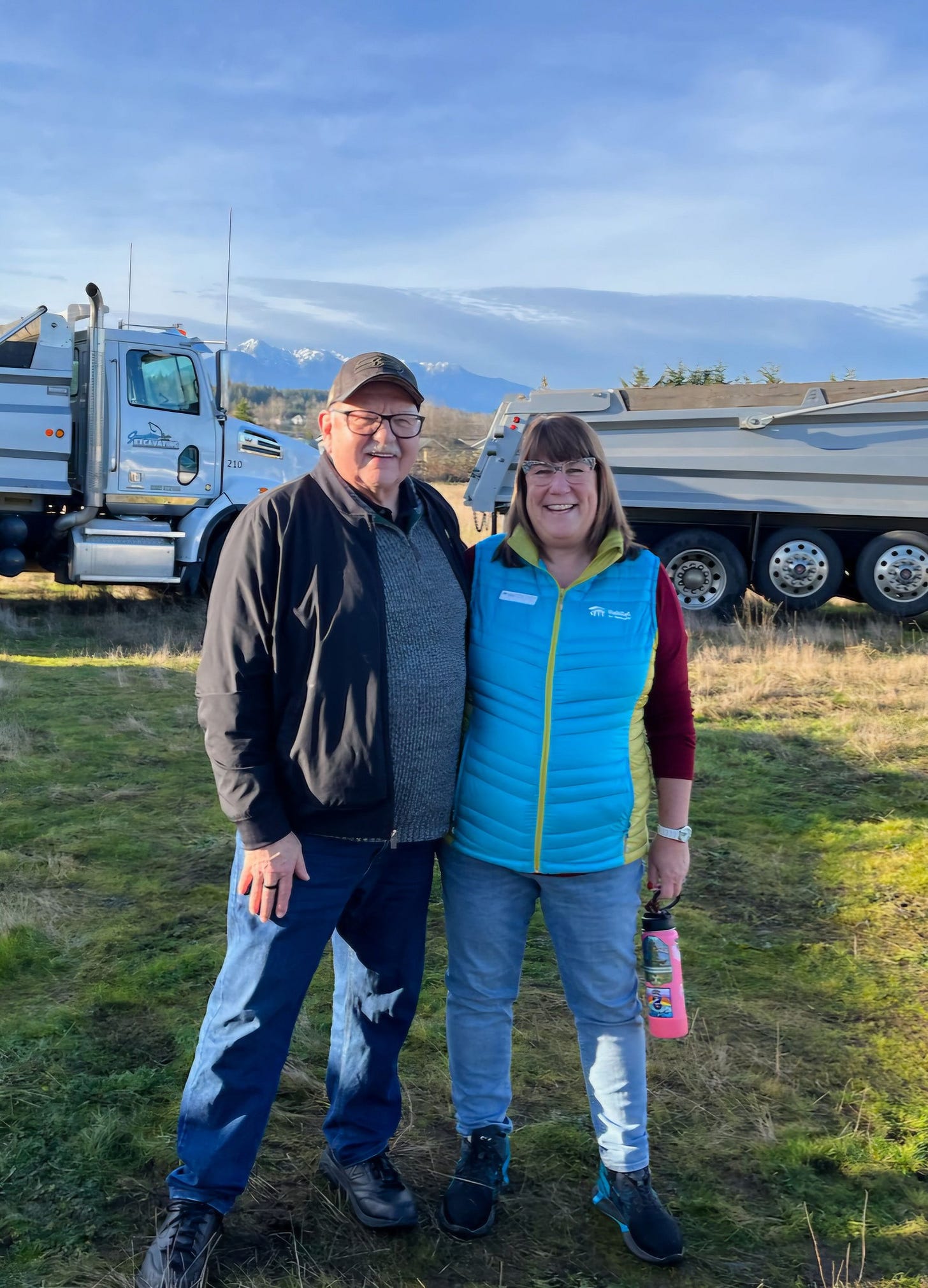
Polls
Last week’s poll asked subscribers if they thought Clallam County residents were racist. Out of 251 votes, 93% said “no,” 6% said “yes,” and 2% said “only the white people.”




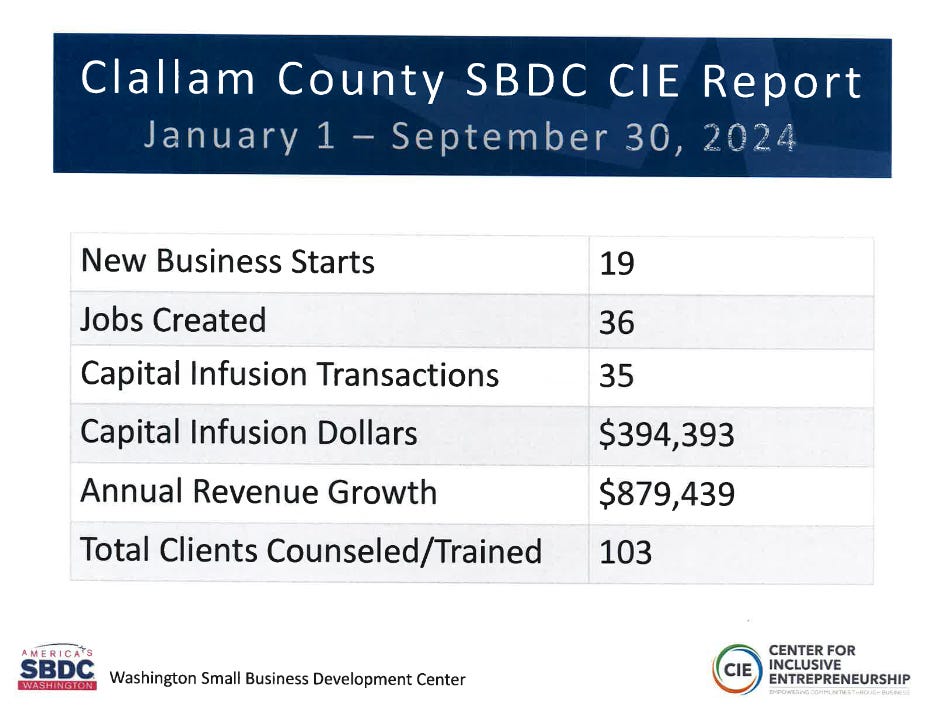
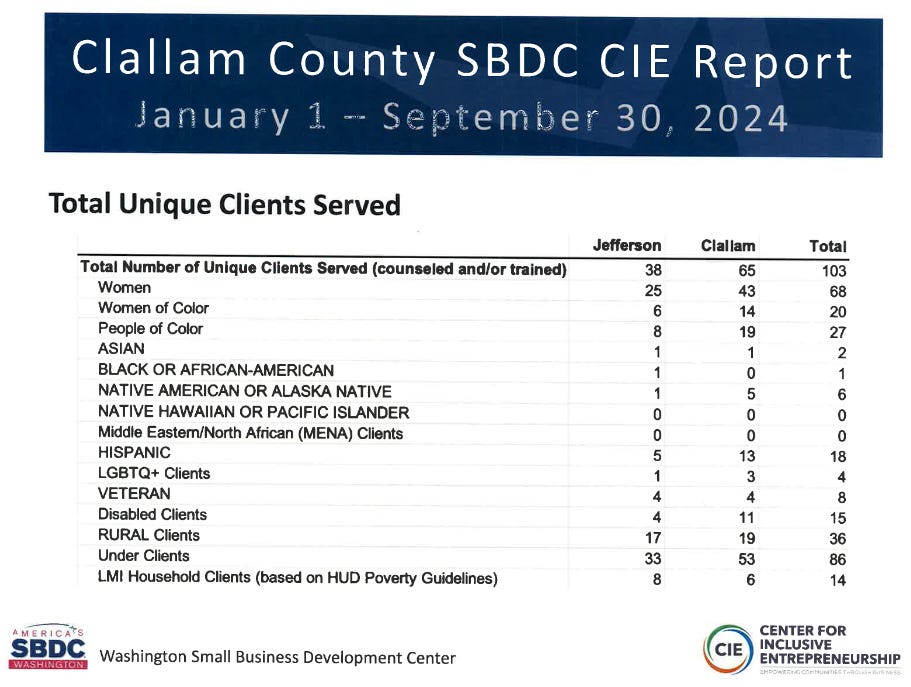
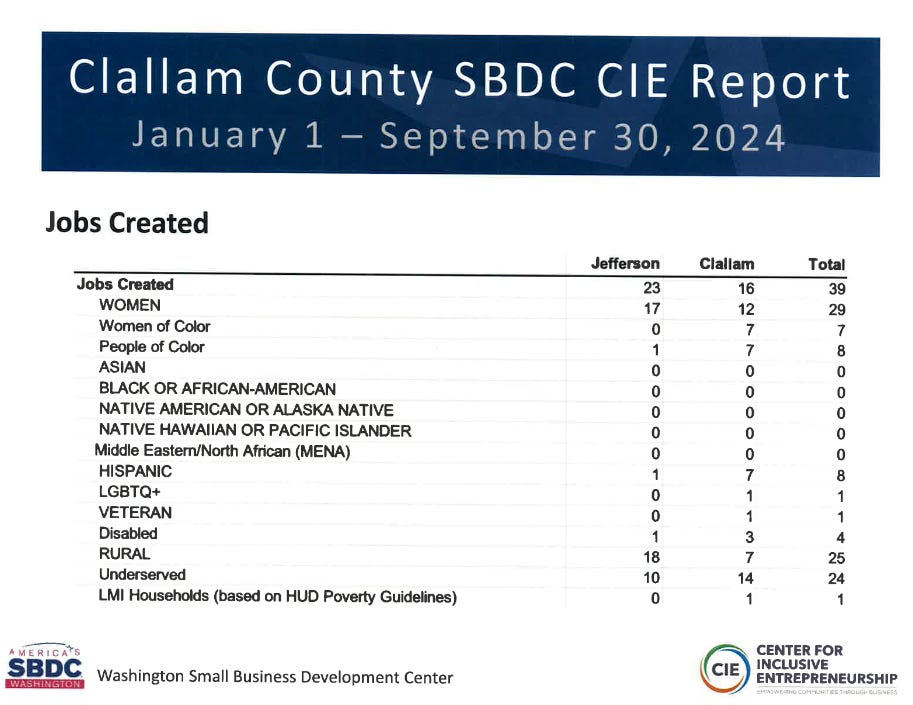
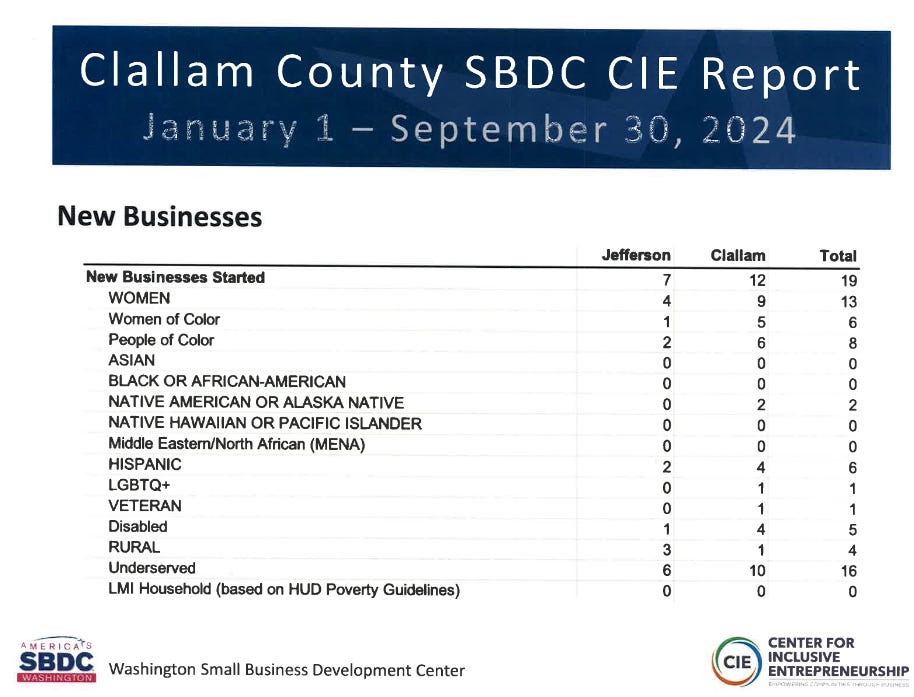
And it goes without saying, but I will say it: THANK YOU JEFF for yet another expose to the constant, undammed flow of manure from our government, all the while $Millions are being spent for brochures to tell us that it is chocolate sauce!
Amazing data you dig up!. Very enlightening. The facts speak for themselves....Stop wasting money on programs such as the "Center for Inclusive Entrepreneurship". That million bucks likely could have beeen spent more wisely. One of the most "oppressed" group in this area, already has lifted themselves....in one of the most American ways possible.... entrenpeneurship! Singling out groups like CIE is dividing this country and it needs to stop.